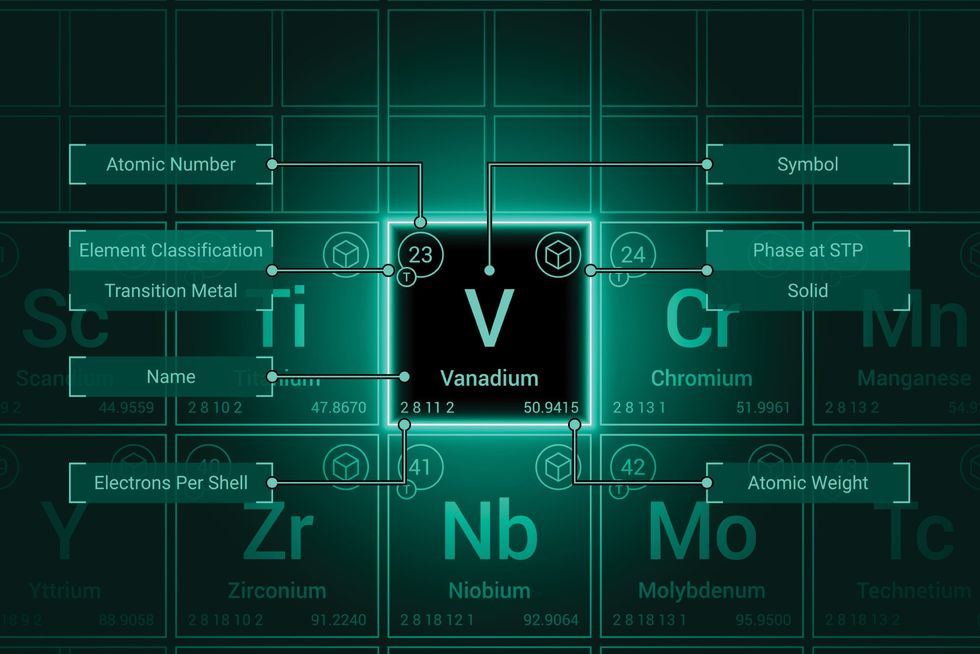Global vanadium-producing countries have benefited from infrastructure spending in China in recent years. However, in 2024 and beyond, the market is likely to be driven by demand related to energy storage as well.
While vanadium consumption has softened in recent months, there is still plenty of optimism that the market’s medium- to long-term outlook remains strong. As mentioned, part of that is to do with the energy transition.
On the supply side, vanadium production has fallen in recent years as producers respond to lower levels of demand. Coming in at 110,000 metric tons (MT) in 2021, mined production of the metal dropped to 102,000 MT in 2022 and fell further to 100,000 MT in 2023, as per the most recent data from the US Geological Survey.
Four countries contribute to the vast majority of that output. Below is a brief overview of these top vanadium producers.
1. China
Mine production: 68,000 MT
China was the world’s top vanadium-producing country in 2023 with output of 68,000 MT. That’s compared to 66,900 MT produced in 2022 and 70,300 MT in 202. The Asian nation far outpaces all other countries in terms of vanadium-mining output, and leads the world in vanadium consumption as well due to its high steel production.
In terms of vanadium exports, China’s are “quite small”, according to Fastmarkets, as producers can turn a bigger profit in the domestic market.
2. Russia
Mine production: 20,000 MT
Second on the list is Russia, whose vanadium output totaled 20,000 MT in 2023, essentially on par with production in the previous two years. Russia’s vanadium reserves are the second largest in the world at 5,000 MT.
EVRAZ KGOK, part of EVRAZ (LSE:EVR), is a major mining company in Russia that produces vanadium. Little other information is available about vanadium mining in Russia.
3. South Africa
Mine production: 9,100 MT
South Africa’s vanadium output is on an uptrend, reaching 9,1000 MT in 2023. In 2018, the country’s output dropped to 7,700 MT, and has been slowly recovering since. In 2022, mining grew by 230 MT over the previous year.
South Africa’s contributions to the vanadium market consist of primary production from Bushveld Minerals (LSE:BMN) and Glencore (LSE:GLEN,OTC Pink:GLCNF). Bushveld Minerals’ vanadium division consists of four core assets: the Vametco mine and processing facility; the Vanchem processing facility; the mokopane vanadium mine; and the Belco production plant. Glencore’s Rhovan open-cast mine and smelter complex mainly produces ferrovanadium and vanadium pentoxide.
4. Brazil
Mine production: 6,400 MT
Brazil’s vanadium output for 2023 ramped up from the previous year by 560 MT to hit 6,400 MT. Brazil’s production is largely thanks to Largo Resources (TSX:LGO,NASDAQ:LGO), which describes itself as the only pure-play vanadium producer. The company’s Maracas Menchen vanadium asset is the highest-grade vanadium mine in the world.
FAQs for vanadium
Who is the largest exporter of vanadium?
Brazil is the world’s largest exporter of vanadium, with Russia and South Africa rounding out the top three. Brazil alone is responsible for nearly one-quarter of the metal’s global export market, and the combined trio represents nearly 60 percent of the market.
Which country has the most vanadium reserves?
Australia has the highest vanadium reserves in the world, coming in at 8.5 million MT as of 2023, although it should be noted that only 1.7 million MT are JORC compliant. Russia is in second place with 5 million MT of vanadium reserves, while China is next in line with vanadium reserves of 4.4 million.
What is vanadium used for?
Vanadium is essential in various alloys, with the most common being ferrovanadium, an alloy of iron and vanadium metal that is used in steel production. Beyond these traditional applications, the silvery-gray metal’s uses in the battery industry are growing — it’s increasingly being used in vanadium redox batteries for large-scale stationary energy storage.
Don’t forget to follow us @INN_Resource for real-time news updates!
Securities Disclosure: I, Melissa Pistilli, hold no direct investment interest in any company mentioned in this article.
Credit: Source link




